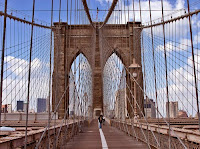Sitting through The Kids Are All Right this evening, I realized that I have indeed become people I knew long ago and at times thought so old and fogey: my parents. They, however, would have walked out of the movie. That did not even occur to me. The story of a lesbian couple whose son and daughter decide to meet their moms' sperm donor, The Kids Are All Right was a mediocre film. There were a couple of good, well-acted scenes and some of the characters were interesting, if not compelling. The premise, definitely interesting; the fling between one of the moms and the donor, also interesting. Choosing nuance over near-porn would have been better.
The "father," played by Mark Rufallo was a quirky, endearing crunchy granola type. Annette Benning and Julianne Moore played fairly one-dimensional characters I found difficult to care too much about. Much of the movie was comprised of gay and straight sex scenes, predictable plot events, and sentimental psychobabble. As my sister-in-law and I discussed it over dinner, we mentioned that it had received fairly positive reviews, so we must be out of the loop. Or, maybe it's just bad form not to like a film with such a hip alternative family, whose members apologize for "not being (their) highest (selves) lately." But, we both agreed that we didn't need to sit through gratuitous sex scenes and bad acting and that not loving the movie didn't make us intolerant. So there.
Saturday, August 21, 2010
Tuesday, August 10, 2010
Across the Brooklyn Bridge At Last
It took me a few decades, but I finally took a leisurely stroll across the world's most famous suspension bridge. And what a beautiful morning for it. Pictures to come but for now, a little Hart Crane.
To Brooklyn Bridge
How many dawns, chill from his rippling rest
To Brooklyn Bridge
How many dawns, chill from his rippling rest
The seagull's wings shall dip and pivot him, Shedding white rings of tumult, building high Over the chained bay waters Liberty-- Then, with inviolate curve, forsake our eyes As apparitional as sails that cross Some page of figures to be filed away; --Till elevators drop us from our day . . . I think of cinemas, panoramic sleights With multitudes bent toward some flashing scene Never disclosed, but hastened to again, Foretold to other eyes on the same screen; And Thee, across the harbor, silver-paced As though the sun took step of thee, yet left Some motion ever unspent in thy stride,-- Implicitly thy freedom staying thee! Out of some subway scuttle, cell or loft A bedlamite speeds to thy parapets, Tilting there momently, shrill shirt ballooning, A jest falls from the speechless caravan. Down Wall, from girder into street noon leaks, A rip-tooth of the sky's acetylene; All afternoon the cloud-flown derricks turn . . . Thy cables breathe the North Atlantic still. And obscure as that heaven of the Jews, Thy guerdon . . . Accolade thou dost bestow Of anonymity time cannot raise: Vibrant reprieve and pardon thou dost show. O harp and altar, of the fury fused, (How could mere toil align thy choiring strings!) Terrific threshold of the prophet's pledge, Prayer of pariah, and the lover's cry,-- Again the traffic lights that skim thy swift Unfractioned idiom, immaculate sigh of stars, Beading thy path--condense eternity: And we have seen night lifted in thine arms. Under thy shadow by the piers I waited; Only in darkness is thy shadow clear. The City's fiery parcels all undone, Already snow submerges an iron year . . . O Sleepless as the river under thee, Vaulting the sea, the prairies' dreaming sod, Unto us lowliest sometime sweep, descend And of the curveship lend a myth to God.
Friday, August 6, 2010
A Wonderful Debut Novel Of Many Things, Including the Japanese Internment
As a student in elementary and high school during the Vietnam War years, I have no memory of ever learning about the internment of Japanese Americans during World War II. As a matter of fact, not too much mention was made in school about Vietnam either. But, in college and much more so later in life, I filled in the gaps by reading widely and viewing many films, including documentaries. Most recently, I read a wonderfully moving novel set in Seattle's Nihonmachi also referred to as "Japantown" which bordered Seattle's Chinatown and other ethnic and racial enclaves during the war.
Written by Jamie Ford, a third generation Chinese American, Hotel on the Corner of Bitter and Sweet recounts the story of Henry Lee, a Chinese American boy of 12 and his Japanese American best friend Keiko Okabe, who is sent with her family to the Minidoka Relocation Center in Idaho. The action shifts from the present (1986) life of 56 year-old, recently-widowed Henry to the past (1942) as 12 year-old Henry struggles in school with jingoistic bullies and at home with a fiercely traditional Chinese father who hates all things Japanese. After the attack on Pearl Harbor, his father gives Henry a button to wear on his coat which reads, "I am Chinese." For Henry it might as well read "Beat Me Up Daily."
The symbolic setting and title character is the Panama Hotel, the center of Japanese American culture pre WWII, which became a secret storage space for family heirlooms and precious possessions that citizens could not take with them as they boarded trains for the camps. The hotel looms large in the past and the present of this beautifully crafted story as the reader journeys back and forth in time with Henry Lee - a character worth getting to know and a time in our history worth knowing about.
Subscribe to:
Comments (Atom)

